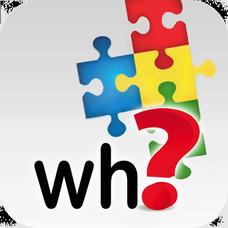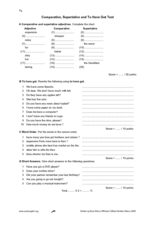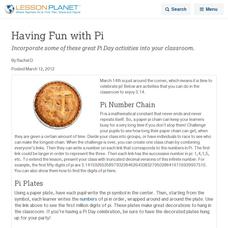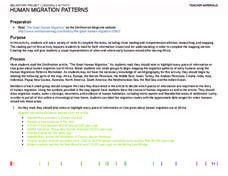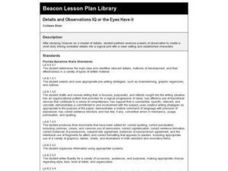Curated OER
Must, Have got to, Have to
In this must, have got to, and have to worksheet, students read examples of when to use each in a sentence. Students also read the examples for the past and present.
Curated OER
What Have You Done?
In this have or have not done something worksheet, students write if they have or have not done things, join verbs and expressions, and write sentences. Students complete 3 activities.
Curated OER
Must Have, Can´t Have
In this must have and can't have worksheet, students read the situations and write sentences using must have or can't have to respond to the situations. Students complete 10 problems.
Curated OER
Have to/ Had to
In this have to and had to worksheet, learners fill in the blanks with have to and had to, and match verbs to their meanings. Students complete 2 activities.
John Talavera
Autism iHelp – WH Questions
Who, what, when, where, and why questions are often the questions that teachers use to foster engagement, verbal communication skills, higher-order thinking, and hopefully, a deeper understanding of the world. This tool is geared toward...
San Francisco Public Utilities Commission
Hetch Hetchy: The Story of San Francisco's Water
How did San Francisco supply enough water for its residents over the last two centuries? Learn about droughts and water conservation in California, as well as specific historical events that led to the water system today. Kids read...
Curated OER
ESL Grammar: Have to/Don't Have to
In these English Language grammar worksheets, learners complete several exercises that help them learn to write the positive or negative form of 'have to.' Students write sentences use 'have to' or 'don't have to' depending on the...
Curated OER
Comparative, Superlative, and To Have Got Test
In this comparative and superlative activity, students complete a chart which has them write the comparative and superlative forms of adjectives, put words in the correct word order, answer short answer questions, and rewrite sentences...
Curated OER
Auxiliaries- Be, Have, Do
In this auxiliaries worksheet, students write negative and question sentences using auxiliaries be, have, and do. Students complete 22 statements.
Curated OER
Adding to the Picture: The 1963 March on Washington
Who do your scholars imagine when they think about the civil rights movement? If only a few faces come to mind, this lesson will expand their concepts of the movement's leaders. Learners examine an image of the 1963 March on Washington,...
Curated OER
Have: What Pets Do They Have?
In this word recognition worksheet, students use 8 picture clues and phrases to write 8 sentence answers. Each sentence begins with he needs or she needs and ends with a pet name.
Curated OER
What Famous Landmarks Have You Visited?
Responding to blog posts can increase written communication skills, critical thinking skills, and the use of social media as a means for discussion. Kids will compose a blog post in response to the provided article related to famous...
Curated OER
Student Opinion: What Small Things Have You Seen and Taken Note of Today?
An interesting and unusual topic for a news article, this resource from the New York Times website asks learners to take a moment and consider all the things they notice during a typical day. Based of the editorial piece "Things I...
Curated OER
Having Fun with Pi
Incorporate some of these great activities for Pi Day in your classroom
Big History Project
Human Migration Patterns
Humans have been on the move for millennia. Using an article from The Smithsonian, pupils chart human movement before written history on a world map. In addition, they examine the modes of transportation used by different waves of human...
Curated OER
Must and Have to
Use this assignment to help address CCSS.ELA.Literacy.L.4.1b in your fourth grade language arts curriculum. The modal auxiliary verbs "must" and "have to" are explained in terms of the roles that they play. Examples are provided, and...
Curated OER
Calculating Parts per Million: Do We Have a Problem Here?
Students calculate ppm and ppb by using unit analysis when given a ratio of amounts.
They determine in ppm what constitutes a health risk for a particular toxin given data
and whether local health officials should close a lake...
Curated OER
"Water Has Many Uses" Mini-unit
Students understand the importance of water as a resource in our lives. In this water mini-unit students recognize that not all countries have water available as we do. Students discuss and explain a plan for responsibilities of getting...
Curated OER
Details and Observations IQ or the Eyes Have it
Fourth graders study Chaucer as a master of details. Then, they create a short story linking unrelated details into a logical plot with a clear setting and established characters. This lesson plan has some excellent worksheets attached!
Curated OER
Do You Have a Sinking Feeling
Students determine how marine archaeologists use historical and archaeological data to draw inferences about shipwrecks. Students plot the position of a shipwrecked vessel, and draw inferences about the shipwreck from artifacts that have...
Curated OER
Have a Ball with Bernoulli
Third graders investigate Bernoulli's Principle. In this Bernoulli's Principle lesson, 3rd graders examine blowing air through a tube and the movement of the ball. Students make inquiries into what effect the air has on the ball and...
Curated OER
Why Koala Has A Stumpy Tail
Students examine Australian folktales. In this folktales lesson, students read the Australian folktale, Why Koala Has a Stumpy Tale. Students list characteristics of the characters from the book. Students act out these characteristics...
Curated OER
Have you seen the man on the moon?
Students study about the phases of the moon and create a picture of the night sky. They use Super print or Kid Pix to create the picture. Students also decide if the picture they have chosen is good for seeing moon and stars or not.
Curated OER
From Ada to Grace to Sandy - Women Have IT
Explore the significant contributions women have made in the field of information technology with an instructive lesson plan. Through class discussion and research, young scholars discover how women have aided in the growth of the field...
Other popular searches
- 1st Grade Grammar Has/have
- Helping Verbs Have Has
- I Have Who Has
- Have and Has
- I Have Who Has Game
- Using Has and Have
- Have To/has To
- Verbs Has and Have
- Have Got Has Got
- Have Has Had
- Language Has and Have
- Have Got /Has Got




